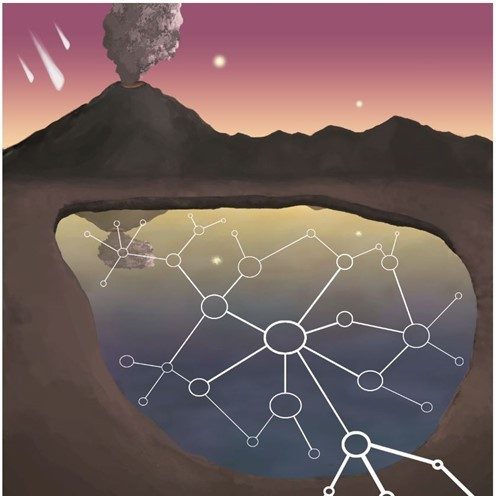Autocatalytic Chemical Reaction Networks

You’ve probably heard before that where we find liquid water on Earth, we tend to find life – given other essential elements like carbon and an energy source are present. But perhaps you’ve never heard that where we find life, we find autocatalysis. But what is autocatalysis? In an autocatalytic reaction, the catalyst is also the product of the reaction. This may sound like a simple statement, but autocatalysis has far reaching consequences that life exploits all the time, the first and foremost of which is a means of replication. In an autocatalytic reaction, you start with one molecule of the autocatalyst and you end up with two. In essence, life can be thought of as a very complicated set of autocatalytic reactions that allows an organism to reproduce itself.
So did life start out as a relatively simple set of autocatalytic reactions?

Jeremy Tran is a PhD student at the Australian Centre for Astrobiology at UNSW researching the answer this question. His research is focusing on investigating the formose reaction, an autocatalytic reaction that can produces sugars which are important for making molecules like RNA and DNA and is simple enough that it could have occurred on early Earth. His work is expanding our understanding for how this autocatalytic reaction network could have produced precursors for RNA and DNA synthesis in a way that models how a primitive cell may have operated.
Are you ready to contribute to world-class research?
Projects run through UNSW include interdisciplinary, local and international collaborations. Below is a summary of projects focused on autocatalytic and related prebiotic reactions headed by the Fahrenbach, opens in a new window and Wang, opens in a new window groups.
Current Projects
Project title |
Contact to email |
Using the formose reaction to model protometabolism |
Fahrenbach Group, opens in a new window
|
Understanding autocatalysis in protocell vesicles |
Fahrenbach, opens in a new window and Wang, opens in a new window Groups
|
New models of prebiotic sugar and nucleotide synthesis |
Project title
Using the formose reaction to model protometabolism
Contact to email
Fahrenbach Group, opens in a new window
Project title
Understanding autocatalysis in protocell vesicles
Contact to email
Fahrenbach, opens in a new window and Wang, opens in a new window Groups
Project title
New models of prebiotic sugar and nucleotide synthesis
Contact to email
Interested in astrobiology but don’t know where to start? Get involved!
There are many pathways towards a career in astrobiology at UNSW. Find a course that is right for you here, opens in a new window.
Here are some units relevant to autocatalytic chemical reaction networks:
CHEM1041, opens in a new window – Higher Chemistry 1B: Here you will learn the fundamentals of organic synthesis.
CHEM2701, opens in a new window – Chemical Origins of Life: In this course, you will learn about specific chemistry thought important for life’s origins.
BEES2741, opens in a new window – Introduction to Astrobiology: Learn about the current scientific understand of life on Earth and its potential in the wider universe.
Get involved at UNSW!
Join in on the ACA action and come to the ACA Student Seminars Series, which happen regularly on Wednesdays – and enjoy the free pizza! Missed a seminar? You can watch a selection on the ACA YouTube channel, opens in a new window.
Are you generally interested in chemistry? Also consider joining Students of Chemistry Society, opens in a new window (SOCS)!
Also consider watching NASA Astrobiology’s Prebiotic Chemistry and Early Earth Environments (PCE3) seminars on YouTube, opens in a new window.

Curious to learn more now?
Here are some relevant publications:
H. James Cleaves II. (2008). ‘The Prebiotic Geochemistry of Formaldehyde’. Precambrian Res 16(3–4): 111–118.
Robert Shapiro. (1988). ‘Prebiotic Ribose Synthesis: A Critical Analysis’. Origins Life Evol Biosphere 18: 71–85.
Mahipal Yadav, Ravi Kumar, and Ramanarayanan Krishnamurthy. (2020). ‘Chemistry of Abiotic Nucleotide Synthesis’. Chem Rev 120(11): 4766–4805.
Steven A. Benner, Hyo-Joong Kim, and Matthew A. Carrigan. (2012). ‘Asphalt, Water, and the Prebiotic Synthesis of Ribose, Ribonucleosides, and RNA’. Acc Chem Res 45(12): 2025–2034.
John D. Sutherland. (2016). ‘The Origin of Life—Out of the Blue’. Angew Chem Int Ed 55(1): 104–121.
Stay up to date with the latest news!
- Seminar Series: Prebiotic Chemistry, opens in a new window (Dr Nick Green – A Prebiotic Photochemical Link between DNA and RNA)
- ACA Seminar by Dr Yosuke Hoshino on Isoprenoids at the origin of life: Palaeobiochemistry of life’s building blocks, opens in a new window
